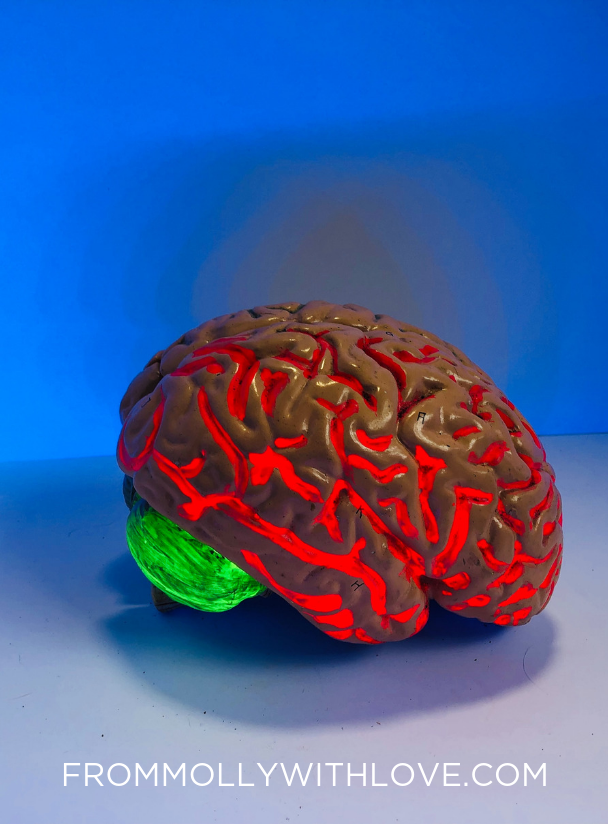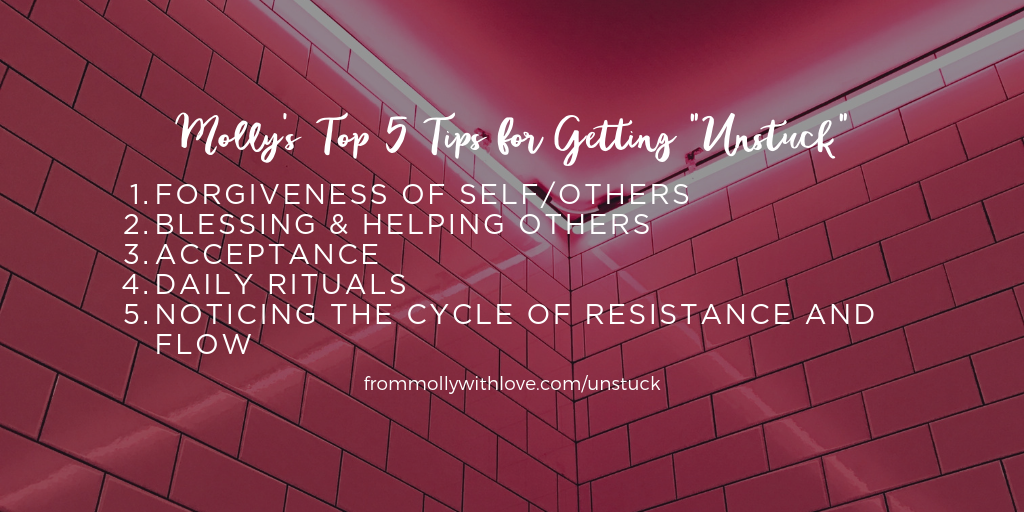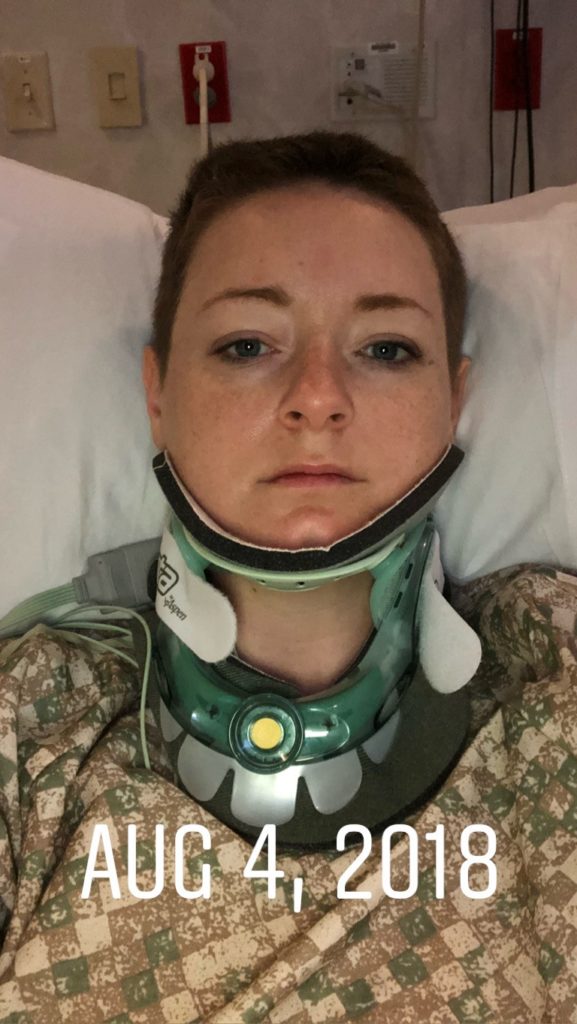
Self-Care Post TBI (Traumatic Brain Injury)
Haven’t had a TBI or concussion? This post is still for you if you are in need of some supreme self-care for whatever life throws your way.
In August 2018, as I was preparing for a morning meeting, I fell down a flight of stairs.
I have no memory of the fall, but from doctor’s reports, I cracked the back of my noggin and suffered a basal skull fracture that knocked me unconscious. As my skull was fracturing, my brain ping-ponged inside of my skull; damaging, bruising, and bloodying my frontal lobe (the part of your brain where you have executive functions, like emotions, thoughts, feelings, etc). I spent four days in ICU. You can read more about the actual brain injury itself and how it has impacted me here.
One moment. One slip. One freak accident. I realized that’s all it takes to alter the course of one’s life.
This injury did just that. It was a defining moment in my life. There are only pre-TBI and post-TBI worlds for me now.
When you get a severe brain injury, it screws with almost every single aspect of your health (depending on where you hit, how, and the severity of the fall). Since suffering the traumatic brain injury (TBI), I have been plagued with multiple symptoms of PCS (post-concussive disorder) that include the following:
- I lost 25% of my body weight (or 40 pounds) in one-year, unintentionally. The switch that tells me to eat has been flipped off. At first, this side effect was cool…now, it’s scary.
- Food tasted like metal for a long time – that has finally gotten better
- Headaches (daily, still)
- Dizziness/vertigo (daily, still)
- Nausea (daily, still)
- Major Depressive Disorder (this was a fun diagnosis. daily, still)
- Panic Disorder (this was fun too; the panic/anxiety is getting better from CBT – cognitive-behavioral therapy)
- Memory impairment (daily, still) – I have to write EVERYTHING…and I mean EVERYTHING down or I won’t remember it. I don’t remember conversations I had yesterday. I have to ask people to repeat things for me, etc, etc.
- Brain fog (daily, still)
- Cognitive impairment (subsiding, but I still mix up words and letters, struggle to find common words in my vernacular, etc)
- Chronic fatigue (daily, still). I drink sooo much caffeine just to get through a regular workday
- Digestive issues (daily, still)
- Eye/vision issues (daily, still). My eyes get tired way faster and sometimes when I am on the computer or reading for too long, I will start to get double vision or things will cross together.
- Loss of smell (recovered)
- Weakness (daily, still)
- Chronic pain (on & off from TBI-induced fibromyalgia)
- Attention Deficit (daily, still)
- And more that I am probably forgetting
I walk around looking “normal” so I don’t look sick. But I am still, one year after the accident, very sick. TBIs have a long recovery process. It may take me five years or more to get back to where I was pre-TBI. And in some ways, my personality will be forever changed.
Because I am a startup founder, I did not get to take disability. Our business had to keep operating despite the injury and I did not get to take much time off of work. My first self-care tip post-TBI or for any other chronic illness is to take as much time off of work as you can afford. Take more time than you think you need. I am sure my recovery is being delayed because of this.
And when we talk self-care at From Molly With Love, we recognize that, as Lizzo says, “self-care has to be rooted in self-preservation, not just mimosas and spa days.”
I practice serious, deep self-care that involves my body, mind, and soul. Self-care doesn’t mean you need to go out right now and buy ALL the skincare products (but if you want to…you can here. haha) or drain your bank account at the spa.
Self-care is something to be practiced daily, repeatedly, as often as possible.
Here are the rest of my RADICAL self-care tips post-TBI or whenever you feel you need extra TLC.
1. Rest as much as possible.
I know this may seem obvious. But I also know that many of us suffer from productivity anxiety.
I know I do. I talk a lot about the importance of self-care, but prior to the TBI, I wasn’t really eating my own dog food. I’m ambitious. Suddenly, I was forced to rest and recon with the fact that:
- It is OK that I’m not filling up my day with “doing.” My business will not collapse because I take two days to rest each week. It will not collapse if I take an hour nap during the day if I need one. It will not collapse if I take a break. My world will not fall apart because I take time to rest.
- I cannot do what I am doing in the world without first looking after my health
- I need to rest in order to be productive, so in a sense, rest IS productive
- My worth on this planet should not be conflated with “how much I can DO/accomplish.”
Do these thoughts sound familiar? I was forced to get over my productivity anxiety. And even though I couldn’t take disability leave after my accident, I am lucky that I get to set my own schedule. If you work for yourself, take advantage of this. Work when you have energy. Rest when you don’t.
Your body needs rest – and more of it than you think you need. If you’re not sleeping well, talk to your doctor about it.
If you suffer from productivity anxiety, it may take practice/time for you to get it over it. Every time you resist this temptation, it strengthens your neuroplasticity and helps build new habits/automatic responses. Just keep trying and one day, it will stick.
P.S. I took my post-TBI learnings and did a free workshop on how to get “unstuck.” These are the 5 main takeaways, but I highly recommend downloading this free workshop to get more detailed on them: frommollywithlove.com/unstuck.

2. Develop a short morning (and maybe even evening) routine that makes you feel good.
Post TBI, most people suffer mental health challenges. I am not afraid to talk about this – so here we go. I suffered from regular occasional depression & anxiety prior to the fall and was already on psychiatric medication.
But after the accident, my mental health fell off a cliff. You don’t get away from a frontal lobe injury without suffering from some mental health disturbances.
My regular old depression and anxiety upgraded to Major Depressive Disorder and Panic Disorder. SUPER FUN, let me tell you. I’d have sometimes up to four panic attacks a day where I felt like I was dying. I even had to go to the ER once because I thought I was having a heart attack. Nope, just good old fashioned anxiety. My limbs go numb. My ears ring. I hyperventilate. My heart gallops out of my chest.
One of the things that helped me manage this (other than psychotherapy, medical treatments, and medications) was developing a daily routine that makes me feel good. So on a good day, I will:
- Sleep until my natural body clock wakes me. Usually about 8:00 – 8:30 am. I would have been appalled at this 4 – 5 years ago, when I was up by 6:30ish and already filling my day by 8.
- Do some deep breathing and try not to dive headfirst into email & bank account checking.
- Slather my face, hands, and cuticles with From Molly WIth Love beauty oil
- Take my medications / drink water and caffeine
- Read daily inspirations, quotes, or from a spiritual text. I am working on A Course in Miracles right now.
- Meditate. I usually only do 5 – 10 minutes in the morning but it really does help start my day off right.
- A little bit of journaling or a quick gratitude list
Sometimes I feel the need to draw out this process and spend 45 – 60 mins on it. Sometimes I’m in and out in 15 minutes. Sometimes I forget to do this and then I always feel like shit when I don’t.
It not only helps with my mental health (which is often “off” for most people first thing in the morning). But it helps with my brain fog, fatigue, attention span, and general functioning throughout the day.
I recommend developing a routine that works for you. You don’t need to copy mine or anyone else’s.
3. Cognitive Behavioral Therapy (CBT)
I am not a doctor, so I’m not an expert on Cognitive Behavioral Therapy (CBT). However, I have had to do a lot of it since my accident and it has CHANGED MY LIFE.
From my experience, Cognitive Behavioral Therapy is all about being willing to look at life through a different lens to decrease your pain & suffering.
So here are some little CBT tricks that have helped me come back from Major Depressive Disorder and Panic Disorder:
- I am no longer “reactive” with my thoughts & emotions. I create a space between a stimulus and my response to it. For example, if we’re low on cash flow for the business, I used to immediately freak out. Automatic response. Now, I take a deep breath and accept my circumstances. I take a minute to think – is this in my control or not? If not, I can’t spend excessive time worrying about it. Have we been in this position before and gotten through it? What is the worst-case scenario? Usually when I stop to think about these things a bit – and detach a little emotionally – I often handle the adversity and stress SOOOOO much better.
- I focus on positive thinking and gratitude. I am not always successful with this, but I practice every day. And every day that I do, my mental health improves bit by bit. I know this is wiring my brain for positivity, instead of defaulting to negativity and anxiety.
- Again, I practice acceptance of my circumstances. Worrying does not change things. Believe it or not, we get a reward from worrying. It makes us feel in control. But again, I ask myself: “Is this a situation I can control?” If yes, I can calmly develop a plan. If not, I cut my brain off from worry as soon as I spot it. Practicing this often has made this my default response. When others around me are needlessly worrying, I either tell them what I need for my own mental health or I remove myself from the situation.
- I no longer let my brain spiral. We lie to ourselves so much. Our ego tells us we’re not good enough, we’re not doing enough, people won’t like us, etc. Instead of indulging that part of my brain that wants to make up untrue stories and run with them, I don’t. I can identify when I start to spiral and cut it off in its tracks.
I feel so much saner now that I practice these principles. They helped me gain a sliver of inner peace. And that’s something we all need.
4. Self-care phone reminders

If you have had a brain injury like me, you may struggle to remember basic self-care activities. For me, that’s eating and drinking enough water. So I have ongoing, periodic reminders on my phone to:
- Eat (as well as posters made by my husband that are all over our house: “Molly, did you eat today?”)
- Drink enough water
- Love myself and send love to others
- Meditate
- Do a round of deep breathing
- Time for bed
- Etc
Even if you haven’t had a brain injury/TBI, you may still struggle with these things. Coding them into your phone to remind you every day can help anyone stay focused on their self-care.
5. Identify what makes you feel good and do more of that
I recently had an epiphany.
I love to sing. I was in choir and musicals in high school, but now really only sing in the car, in the shower, and at karaoke.
Out of nowhere, a thought/memory occurred to me. When I was in the 9th grade, there was a day where I pissed off, scared, and just not having it. I walked into choir class feeling like shit. And I walked out on clouds.
When I remembered this, I downloaded a vocal training app and a karaoke app where I perform songs and share them with others. You can even do duets and produce special effects.
When I just “can’t,” I will lock myself in the bathroom and work on a song. Afterward, I feel much better.
So what did you like to do when you were younger? Can you re-discover that passion or hobby?
I recommend making a list of the things that soothe you or make you feel good. You can download a sample checklist of that here if you need a little help.
For me it’s:
- Singing
- Coloring in coloring books
- Journaling or creative writing (namely songs, poems, and memoir)
- Reading books (OG style: the kind of books you can touch, feel, smell, and hold)
- Skincare and pampering! I will indulge in a fancy bath every once in awhile, complete with candles, bath bombs, essential oils, bath salts, and soothing music. When I have extra time, I will do a “full-on” skincare routine where I multi-mask, layer serums, and massage my face for lymphatic drainage.
- Call or Marco Polo with my mom or other close friends
If you have an extra 10 – 30 minutes in your day – or you can carve that time out – I recommend doing one of these things AT LEAST once a week to soothe your nervous system and turn off the fight-or-flight response.
***
This is just the tip of the iceberg (oh so many cliches. Oh well). Part of my self-care is also focusing on what’s most important and sometimes letting things not be perfect if they don’t need to be (like this blog post, for example). So I may do a part 2, but for now, these are the big guns (heyo, another cliche).
Let me know in the comments if you have any questions or anything to add to this list!




Hi Molly I can so relate to all you are saying here. I am 58 and have been dealing with post concussion syndrome for 51 years. I was hit by a drunk driver at 7. Yup there were dark moments sometimes lasting days, and it took me many years before I figured out I was very in tune with the moon phases. Just knowing this helped. As I could prepare and understand that there is an end as well I also took CBT and it really helps a lot. I raised my son with ADD alone and now I am taking care of my elderly mother in some circles I’m considered an overachiever when it comes to being a caregiver. I tend to put myself on the back burner a lot. Maybe This Is A coping mechanism. My personal life has suffered for it. Anyway my question to you is not for me it’s for someone dear to me. He made a statement when it came to anxiety and depression to find what you love and do it. Which is great advice except the person I’m speaking of has wrapped her whole world around World of Warcraft which is your favourite thing to do and I am afraid that it’s doing more harm and that is in the Escape. Do you have any advice on how you can know when something is truly something you love and the enjoyment helps you or is it somewhere you are escaping to. Blessings and hugs a speedy recovery., Laurie